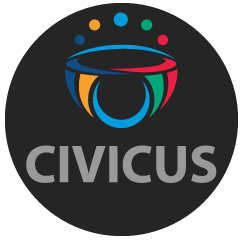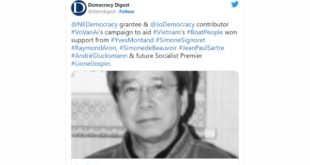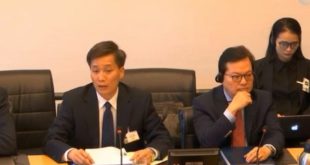 Vice-President of the Vietnam Committee on Human Rights (VCHR), Penelope Faulkner, speaks to CIVICUS about the current challenges faced by civil society in Vietnam and the role of international solidarity networks in supporting the creation of a safe and enabling environment for human rights defenders.
Vice-President of the Vietnam Committee on Human Rights (VCHR), Penelope Faulkner, speaks to CIVICUS about the current challenges faced by civil society in Vietnam and the role of international solidarity networks in supporting the creation of a safe and enabling environment for human rights defenders.
1) Over the past few weeks, the National Assembly has adopted a number of laws which appear to unwarrantedly restrict the activities of independent media, civil society organizations and protestors. Can you tell us about the substance of the laws and what impact they may have on civil society?
The National Assembly adopted two laws related to freedom of expression in March including the amended Press Law. As there is currently no free press in Vietnam, it was hoped that the amendments would open the way for privately-run media. However, this was evidently wishful thinking – not only does all media remain under Communist Party control, but restrictions have increased, with the number of “banned subjects” for journalists leaping from four to thirteen under the amendments. A new Law on Access to the Media, also adopted in March, says more about what information the public cannot access than what it can. The government may block access to any information deemed to infringe on vague notions of “state-interests”, “social order and ethics” etc. The “right to know” in Vietnam is simply the right to know what the government wants to tell you; it’s not a move towards transparency. Another new regulation is Circular 13 which empowers Security forces to disband demonstrations outside Courts when trials are in session. The Circular is aimed at suppressing the increasingly large gatherings of civil society protesting political trials or expressing solidarity with fellow activists. Disturbingly, the Minister of Public Security who issued the Circular has just become the new President of Vietnam.
2) Do you feel these laws are indicative of a wider State intolerance for civil society in Vietnam?
This new frenzy of lawmaking is indicative of a disturbing trend. Vietnam has kept its political system closed because it sees pluralism as a threat to the regime’s survival. In particular, the ruling elite, whom the people call “red capitalists,” fear losing the massive privileges they currently enjoy. As a result, civil society has never had any real space in Vietnam. As Vietnam seeks to play a greater role on the global stage, it is under increasing pressure from the international community to improve its human rights record. In the past, the authorities maintained order through widespread Police crackdowns and high-profile political trials. But Vietnam knows this is bad publicity, so they have found a more subtle strategy – that of using the law to stifle dissent. Chinese dissidents call it the “rule by law”, not the rule of law. Funded generously by the international community, Vietnam has embarked on programmes of “Legal and Judicial System Reform” and passed more laws and regulations than ever before. Yet almost all these news laws contain vaguely worded restrictive provisions that virtually give the state carte blanche to arrest and imprison activists. A new Law on Belief and Religion and Law on Associations are also expected to be adopted this year, both of which follow this restrictive trend.
3) To what extent can independent civil society conduct their legitimate work within such a restrictive context?
Civil society groups operate in Vietnam with extreme difficulty. In fact, what we call “independent civil society” is a very recent phenomenon in Vietnam, and it is still at an embryonic stage. It emerged most visibly with the fast Internet penetration in Vietnam – over 30% of Vietnam’s 93 million population has regular Internet access today – and especially the development of the blog. Blogging provided young people with the means to engage in debates and discussions that were impossible in the official media, and the blogs triggered the emergence of networks and solidarity groups on issues such as press freedom, women’s’ rights, worker rights, environmental issues, sexual equality or land ownership. Civil society activists in Vietnam are extremely brave and determined. Not only do they face arrest and imprisonment, but they are frequently beaten and assaulted by plain-clothed Security agents, threatened and harassed. Indeed, activists know that by speaking out for human rights, they are not only sacrificing their own safety, but also that of their families and friends.
4) Can you describe the primary national and international obstacles to addressing these restrictions and creating an environment in which human rights defenders, protestors and journalists can exercise their rights freely?
The Communist Party’s XII Congress in January 2016 brought a new, hard-line leadership to power in Vietnam. In March 2016, in the space of just two weeks, seven human rights activists were sentenced to a total of 22 years in prison simply for exercising their legitimate rights to freedom of expression and assembly. We fear that this crack-down will continue, and human rights defenders, journalists and critics will be exposed to increasing hardships in the free exercise of their rights in Vietnam.
Internationally, there are many challenges. Firstly, forty-one years after the Vietnam War, Vietnam still enjoys a privileged place in public opinion. Things that are condemned in China or Cuba are often forgiven in Vietnam. Secondly, because Vietnam is a growing economy, business interests often dominate human rights. The European Commission, for example, has just fast-tracked an EU-Vietnam Free Trade Agreement, waiving a mandatory Human Rights Impact Assessment to finalize negotiations. Our Committee and the FIDH filed a joint protest to the EU Ombudsman, who found the Commission guilty of “maladministration”. Despite this, the FTA is going through, with little more than lip-service to Vietnam’s serious human rights concerns. We agree that trade relations can enhance people’s lives, but there is an inconsistency in the policies of many democratic countries on human rights.
5) What role do international solidarity networks such as the Vietnam Committee on Human Rights play in supporting national civil society actors?
I think we play a useful role, especially in amplifying the voices of Vietnamese civil society actors and giving them a wider echo in the international arena. Our Committee is quite special in that we have very close ties with activists in Vietnam – our President Vo Van Ai is the international spokesman for the Unified Buddhist Church of Vietnam (UBCV), one of Vietnam’s most outspoken movements for religious freedom and human rights, and also a well-known writer. At the same time, we speak regularly at the United Nations, European Parliament and other international fora. Many of our staff are Vietnamese, or Vietnamese-speakers like me. This means we can get first-hand stories from activists and launch alerts or international campaigns. We follow the official press and media, and read texts of new laws or regulations in the original. With our experience in international human rights law, we can also analyse new legislation and react swiftly. In brief, we can say and do things that activists in Vietnam could not say or do without ending up in prison! But also, in our Vietnamese-language articles and radio broadcasts, we pursue a longer-term aim of trying to stimulate a culture of human rights and democracy in Vietnam. Young people in Vietnam have never had the opportunity to exchange and debate new ideas and the Diaspora tends to equate democracy with anti-communism. If people don’t learn to respect each other and value their diversity of views, the post-Communist era could be as repressive as the current one!
6) How can regional and international civil society groups offer greater support to civil society in Vietnam?
Regional solidarity is very important, especially in ASEAN, which is growing in importance as an economic and regional community. Strangely, regional CSOs are often unaware of Vietnam’s human rights abuses because the regional press reports only on its economic prowess. They should speak out louder in support of fellow activists in Vietnam. International support is indispensable; it is a real lifeline for beleaguered civil society activists. Public statements, private diplomacy, solidarity, moral and material support – every opportunity is good to support independent civil society in Vietnam!
Read the article on CIVICUS website
 Quê Me Quê Me: Action for democracy in Vietnam & Vietnam Committee on Human Rights
Quê Me Quê Me: Action for democracy in Vietnam & Vietnam Committee on Human Rights




